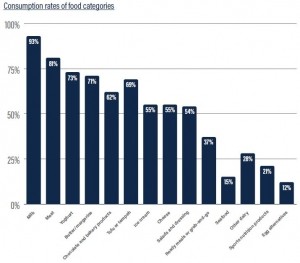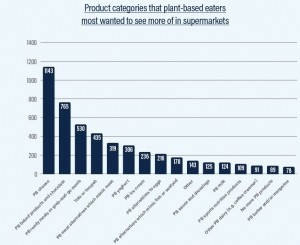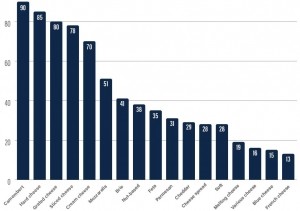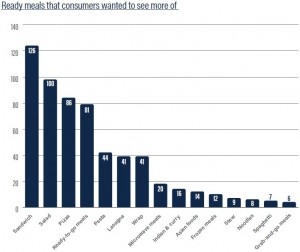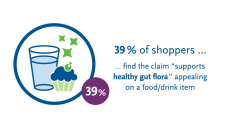Cheese, ready-meals and egg alternatives most in demand among plant-based eaters

Food awareness organisation ProVeg International conducted a survey of 6,221 consumers across nine European countries (the UK, Germany, Austria, France, Belgium, the Netherlands, Switzerland, Denmark, and the Czech Republic) to identify priorities for product improvement and development, based on consumers’ experience of purchasing and consuming plant-based products.
Of the respondents, more than three quarters (76%) were plant-based eaters (people who eat mainly or only plant-based food), while 24% were so-called reducers (people who are reducing or trying to reduce their consumption of meat and/or other animal-based products).
Plant-based cheese was the product that both reducers and plant-based eaters would most like to see more of in supermarkets, the report revealed. Plant-based ready meals were the second most in-demand product for reducers, and the third most in-demand for plant-based eaters.
Reducers would also like to see more plant-based meat alternatives which mimic meat, while plant-based eaters are looking for more plant-based baked goods and chocolates.
Verena Wiederkehr, Head of Food Industry and Retail at ProVeg International, said: “Both plant-based cheese and ready meals represent huge opportunities for growth. We recommend that manufacturers focus on expanding their ranges of these in-demand products and, particularly in the case of plant-based cheeses, work on improving taste and texture. The data supports the view that good quality, affordable plant-based cheeses have a good chance of penetrating, capturing and retaining a large part of a fast-growing and lucrative sector.”
For predictions on the growth of plant-based categories, manufacturers can look to the market for plant-based meat alternatives, which is predicted to double within the next five years. According to figures provided by Markets and Markets, the market is valued at US$12.1 billion in 2019 and is predicted to grow at an annual rate of around 15%, reaching almost US$28 billion by 2025. The global meat market, by comparison, is only predicted to grow by 3% per year, according to Kearney.
Plant-based seafood and egg alternatives
ProVeg said major growth opportunities have also been revealed in plant-based seafood and egg alternatives. Only 16% of reducers have already purchased and tried plant-based seafood, while for egg alternatives the consumption rate is even lower, at only 11%. This is despite strong potential demand for both product categories, particularly in the case of egg alternatives among reducers.
Wiederkehr said: “The combination of strong potential consumer demand and low consumption rates is a recipe for extensive growth opportunities. We are seeing this in the plant-based seafood sector, which is still very much in its infancy, with relatively few manufacturers and little competition. So we recommend that manufacturers seriously consider expanding their product portfolios to include plant-based seafood.
“There are very few stand-alone egg alternatives on the market, far fewer than egg replacements for baking. If we also factor in eggs’ versatility, their breadth of function, and the frequency with which they are consumed, it becomes clear that the plant-based egg space is another major opportunity that is ripe for investors looking to support innovative start-ups.”
Variation between countries
The survey results revealed that European countries vary in terms of their consumption of other plant-based food categories. Belgium and the UK have the highest penetration rates for plant-based cheese, with 67% in both countries, while Danish and UK consumers purchase the most plant-based butter/margarine (80% in both countries).
Not surprisingly, plant-based milk has the highest consumption rate, compared to other categories, varying only minimally across the different markets, with upwards of 90% of people in all countries having consumed it in the previous three months.
However, the purchase and consumption of other plant-based dairy products vary widely across the European nations surveyed, with consumption rates of plant-based cheese the highest in the UK and Belgium (67% in both countries, respectively), and the lowest in France (with 42%), probably due to the devotion of French people to dairy-based cheese and the fact that plant-based cheeses seldom live up to their animal-based counterparts.
Danish and UK consumers, meanwhile, purchase the most plant-based butter/margarine (80% in both countries), at 9 percentage points higher than the all-markets average (71%), while the Danes consume the least plant-based yoghurt (56%), with a rate much lower than the all-markets average (73%).
The consumption of meat alternatives features prominently in the Netherlands, Denmark, Belgium, and the UK, while Austria and Switzerland consume the most plant-based chocolates and baked goods, with 75% and 72% respectively – significantly higher than the all-market average of 62%.
Plant-based ice cream also has the highest penetration in Switzerland and Austria, and the lowest in France and Germany. Penetration rate also varies substantially for plant-based ready meals and grab-and-go meals – from 63% in the UK, where retailers already stock a large range of plant-based ready-meal options, to 26% and 24% in the Netherlands and Switzerland, respectively.
Lower price point needed
When it comes to product attributes (convenience, texture, taste, appearance, naturalness, price, and nutritional value), price was the main area of dissatisfaction for our sample consumers – including both plant-based eaters and reducers – in almost all product categories. ProVeg said this indicated that plant-based food products are perceived as being too expensive and that the food industry should lower the price point of their plant-based products, thus making them available to a broader consumer base.
Why consumers would like to see more plant-based cheese in the market
In response to the question “Why did you state that you would like to see more plant-based cheese in supermarkets?”, nearly two thirds of respondents (65%) wanted to see more plant-based cheese in supermarkets because they think that there are too few options at present. Nearly a quarter of reducers (21%) said they dislike the taste of currently available plant-based cheeses. Some plant-based eaters (14%) are also not satisfied with the taste, as shown below. Both groups also thought that products in this category were too expensive.
What type of cheese do they want?
When consumers were asked to specify the types of plant-based cheese they would like to see more of, many people responded with a long list, suggesting that there is a strong appetite for good alternatives. Given European consumers’ affinity for plant-based cheese, cracking the code here would be incredibly lucrative, stated ProVeg, while helping consumers of all kinds to achieve a higher intake of plant-based alternatives.
What ready-meals do people want?
In the ready-meals product category, sandwiches, salads, pizza, and ready-to-go meals were the products that most consumers wanted to see more of in supermarkets, the report said.
Conclusions
ProVeg said the survey overall has revealed enormous potential growth opportunities for developing and launching new plant-based products in multiple food categories. It suggested expansion of plant-based product portfolios not only means a diversification of risk, but also ‘represents a means of future-proofing businesses’.
The results of the survey also reveal that consumers want to see more variety in terms of product types, raw materials, textures, and flavours, as well as more products suitable for different types of lifestyles and use occasions. This lack of options suggests a great deal of potential when it comes to the development of plant-based products, it said.
Another area where companies can diversify risk is in ingredient choice. The wider variety of ingredients allows the consumer more choice and more exciting flavours, said ProVeg. It noted that ingredients such as pea, fava bean, hemp, sunflower seeds, chickpea, duckweed, algae, and mushroom, as well as ancient grains such as quinoa or amaranth, are increasingly in demand.
“When making any investment in the plant-based sector, careful consideration of the particular plant-based protein source is important,” it said. “The rising demand for innovative products requires a significant increase in new product development across all food categories. Innovation gives consumers a wider choice of products and brands, and allows plant-based products to gain increased shelf space and recognition.”
